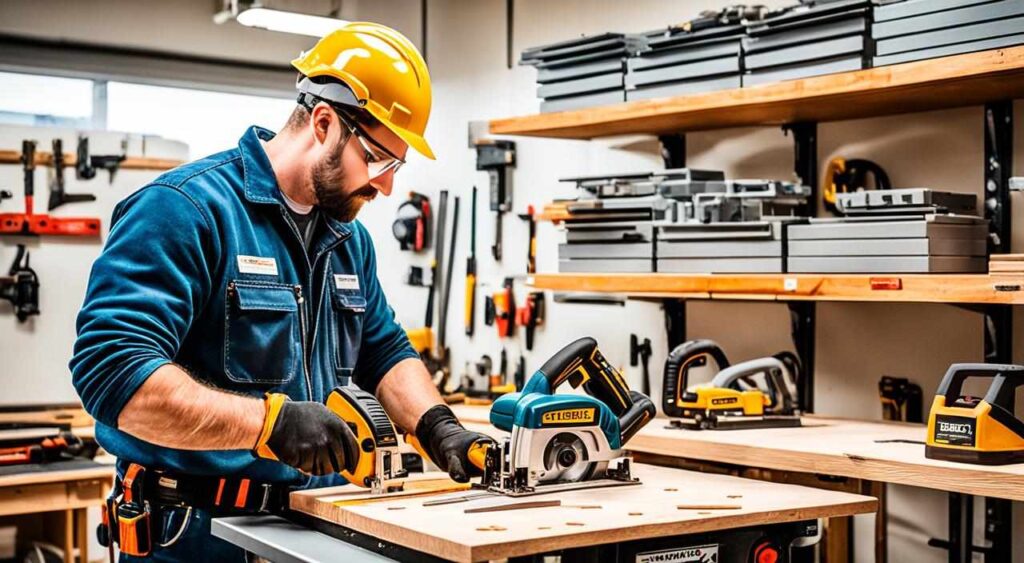Starting a new career is exciting but can be scary, especially if it’s not a common path. Becoming a carpenter without a degree is doable for those who love to build and create. Carpentry is more than just using nails; it’s a way to shape the world around us. This guide aims to help those wanting to learn how to be a carpenter. It gives advice and support for every step.
Key Takeaways
- Learn the essential qualities and traits that make a successful carpenter.
- Discover the various avenues available to develop carpentry skills without formal education.
- Understand the benefits and opportunities associated with carpentry apprenticeships.
- Explore the markets and niches within carpentry that can be specialized in.
- Identify the significance of hands-on experience in the carpentry field.
- Gain insights into the personal and professional growth that carpentry can provide.
Understanding the Role of a Carpenter
If you want to be a carpenter, you must understand a carpentry career means learning what carpenters do, knowing the basics, and getting good at their tasks. Carpenters work with wood to create complex structures and useful items. Let’s look into what’s important for those wanting to get into this craft.
The Fundamentals of Carpentry
The basics of carpentry involve precise measuring, cutting, and constructing. These steps are crucial for both small and big projects. Carpentry is about skillful techniques and valuing the wood used. See the table below for some key carpentry practices:
| Technique | Description | Application |
|---|---|---|
| Measuring & Marking | Using rulers, tapes, and squares to designate cuts accurately. | Essential for any project to ensure pieces fit perfectly. |
| Hand Sawing | Cutting wood manually with precision and control. | Used for finer work where power tools may not be suitable. |
| Chiseling | Carving or cutting wood with a chisel and hammer. | Allows detailed work such as joints and intricate designs. |
| Drilling | Making holes in wood with a drill bit for joinery or hardware. | Crucial for dowel joints and installing hardware. |
Key Skills and Duties in Carpentry
Being a carpenter involves a mix of skills that combine technical knowledge with creativity. One main job is reading blueprints to build structures as designed. They use different tools, like hand saws and power tools, to do their work.
- Interpreting architectural blueprints and drawings
- Selecting appropriate materials for construction projects
- Measuring, cutting, and shaping wood and other materials
- Assembling and joining wood components with nails, screws, or adhesives
- Ensuring structures are level, square, and securely constructed
- Maintaining a safe and organized worksite
Carpentry is always changing, but its main principles stay the same. Knowing and mastering these basics help a new carpenter make high-quality work in this lasting trade.

How to Become a Carpenter Without a Degree
Do you want to learn carpentry but don’t have a degree? Good news. There are ways to become a skilled carpenter. Start with a high school diploma or an equivalent. Then, move on to apprenticeships or training programs to build your skills.
The first step in becoming a carpenter without a degree is basic math and science. A high school education gives you this. These skills help you understand building codes, measure correctly, and know your materials.
Next, enter an apprenticeship, a key step in your journey. This real-world training teaches you everything about carpentry. You’ll learn to cut wood accurately and use tools correctly.
- Look for apprenticeships through trade unions, contractor groups, or job sites.
- Pre-apprenticeship programs can also improve your skills and your application.
- Talk to professional carpenters for advice and mentorship.
Formal training programs are another option. They’re found in vocational schools or colleges. These programs teach you practical skills and sometimes business and safety. Specializing in a carpentry area can lead to better jobs and more money.
If you’re keen on learning carpentry without a degree, make a portfolio. Show off your work from apprenticeships or personal projects. This proves your skill and commitment to great work.
You don’t need formal education for a carpentry career. What you need is dedication, real-world experience, and a love for learning. Take these steps, improve your craft, and you’ll see your carpentry career grow.
Embarking on a Carpentry Apprenticeship
A carpentry apprenticeship is a big step for future carpenters. It blends learning with real job experience. It gives a full understanding of carpentry. Apprentices dive into both theory and hands-on work.
What to Expect in an Apprenticeship
In a carpentry apprenticeship, you might wonder what to expect. These programs last 3-4 years. They mix job training with classes. The teaching covers all needed skills, from simple tool use to complex building techniques.
- Technical Math and Measurement
- Blueprint Reading and Drafting
- Safety Regulations and Procedures
- Tool Proficiency and Maintenance
- Materials Science for Woods and Engineered Products
- Architectural Woodworking and Cabinetry
- Site Layout Work and Framing
- Finish Carpentry Techniques
Apprentices learn these skills in classes and on real job sites. They are guided by experienced workers.
Benefits of Hands-On Learning
Hands-on learning in a carpentry apprenticeship is very helpful. It links classroom lessons to real work. This approach has many benefits:
- Developing practical problem-solving skills
- Building a professional network within the industry
- Understanding the nuances of on-site work culture
- Improving speed and efficiency through practice
- Gaining confidence in working on complex projects
Also, apprentices earn money while learning. This makes it a good financial choice for many.
| Apprenticeship Experience | Benefits |
|---|---|
| On-the-Job Training | Real-time skill building and professional growth |
| Classroom Instruction | Theoretical foundation and understanding of concepts |
| Networking Opportunities | Connection with potential employers and mentors |
| Earnings During Training | Financial support while building a career |
| Skill Certification | Credentials that enhance employability |
In the end, a carpentry apprenticeship offers a strong learning journey. It prepares you with the skills for a great career. With focused training and the benefits of hands-on learning, apprentices become skilled carpenters. They are ready for construction industry challenges.
Navigating Carpentry Training and Education
For anyone wanting to be a carpenter, it’s key to look into all training options. Traditional apprenticeship is a reliable choice, but there are other ways to learn too. These different paths can teach you basic and more advanced carpentry skills, and how to handle the business side of things.
Alternative Educational Paths
The world of education today offers many paths to becoming excellent at carpentry. Vocational schools give hands-on training that mirrors the real carpentry world. Community colleges mix practice with theory, covering important topics like building codes. These schools can prepare you and may even offer certifications to help you get jobs.
Key Areas of Carpentry Study
No matter which learning path you choose, certain carpentry areas are must-knows. You need to understand different building techniques. Reading blueprints is also critical to bringing designs to life. And knowing safety rules is super important to keep everyone safe on the job.
Learning about specialized carpentry areas, like cabinet making, adds to your skill set. This knowledge mixes tradition and new ideas, preparing you for modern construction challenges.
FAQ
Is a degree required to become a carpenter?
No, you can choose other ways to become a carpenter without a degree.
What are the key skills and duties of a carpenter?
Carpenters must know how to work with wood, read blueprints, use tools, and handle various materials.
How can I become a carpenter without a degree?
Start with a high school diploma. Then, look into apprenticeships or find training programs.
What can I expect in a carpentry apprenticeship?
Expect to learn by doing, follow a set course, and gain skills and connections in the industry.
Are there alternative educational paths for aspiring carpenters?
Yes, vocational schools, community colleges, and trade programs also offer carpentry education and training.
What are the key areas of study in carpentry?
Carpentry studies cover building techniques, how to read blueprints, staying safe, and learning special carpentry skills.
